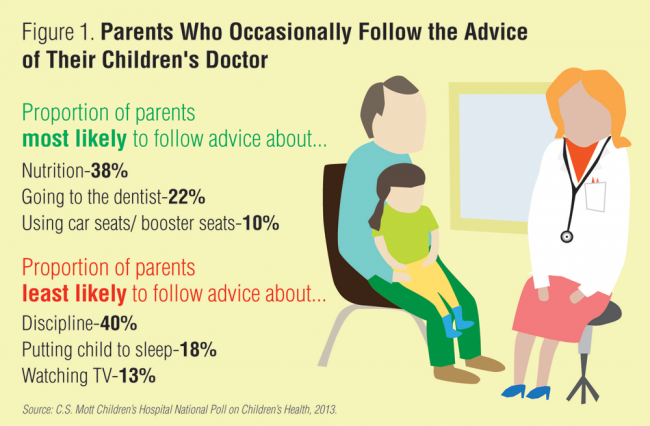Just what the doctor ordered? Not for many parents


Just what the doctor ordered? Not for many parents
Children in the U.S. are recommended to have regular visits with a healthcare provider for well-child care. A large component of well-child care involves the healthcare provider giving parents “anticipatory guidance” – advice about how to keep their children healthy and safe. When parents choose not to follow provider advice about topics such as nutrition and injury prevention, children may be at increased risk for health and safety concerns.
In January 2013, the C.S. Mott Children’s Hospital’s National Poll on Children’s Health asked a national sample of parents of children 0-8 years about the extent to which they follow the advice of their children’s healthcare provider.
Following Advice
The majority of parents report that they follow the advice from their child’s healthcare provider all of the time (31%) or most of the time (56%). However, 13% of parents follow the provider’s advice only occasionally. There is no difference in the frequency of following advice based on the child’s age or the type of provider (pediatrician or family physician).
Parents from lower-income households (<$60,000 annually) are more than twice as likely to say they follow provider advice occasionally (17%), compared to parents from higher-income households (8%). Black and Hispanic parents are twice as likely to follow provider advice only occasionally (22% and 18%, respectively) compared to white parents (9%).
Parents were asked to choose the areas where they are most and least likely to follow the provider advice. Among parents who follow provider advice only occasionally, the topics on which they are most likely to follow advice are nutrition, going to the dentist, and using car seats/booster seats. In contrast, these parents are least likely to follow advice on discipline, putting the child to sleep, and watching TV (Figure 1).
Link to Quality Ratings
Parents’ ratings of the quality of care offered by their children’s healthcare providers are closely linked to whether they follow provider advice. Among parents who rate their child’s provider as “Excellent” on talking to me in a way I can understand, very few (6%) say they follow provider advice only occasionally; however, when the rating drops to “Good/Fair/Poor”, 46% of parents follow provider advice only occasionally. Similarly, with an “Excellent” rating on knowing what works with kids, only 5% of parents follow provider advice occasionally; with a drop to “Good/Fair/Poor”, 41% of parents follow provider advice occasionally. Very similar patterns are seen for parent ratings of providers’ overall medical knowledge and whether the provider listens to the parent’s concerns.

Highlights
- 1 in 10 parents follow the advice of their children’s healthcare provider only occasionally.
- Lower-income, black, and Hispanic parents are more likely to follow provider advice only occasionally.
- Following advice is associated with how parents rate the provider’s quality of care.
Implications
Many major health risks for children are closely tied to parenting behaviors. For example, childhood obesity has been linked to parents allowing the over-consumption of sugar-sweetened beverages and excessive TV watching. Sudden Infant Death Syndrome (SIDS) is associated with putting infants to sleep in the prone position. The risk of injury in a motor vehicle crash is related to use of car seats and booster seats. Detection and treatment of early childhood caries and other oral health problems occurs when parents bring children to the dentist.
This poll shows that 1 in 10 parents do not consistently follow the advice of their children’s healthcare provider. Even more concerning is that occasional adherence to provider advice is higher among certain populations (poorer families, non-white families) whose children are known to have a higher rates of health problems such as obesity, SIDS, and tooth decay.
The way healthcare providers interact with parents appears to have a major impact on whether parents follow the provider advice. Specifically, parents’ report of following advice is linked to whether providers use clear language that parents can understand and whether they listen to parent concerns. Parents also value a practical approach: having a provider who “knows what works with kids” is associated with following advice more often.
The results of this Poll suggest several take-home messages. Parents need to ask for clarification or specific examples if they are unsure about what the provider is saying, or why it’s important. Providers should work on using clear language, asking parents about their concerns, and giving practical examples of what works with children of different ages.

Data Source & Methods
This report presents findings from a nationally representative household survey conducted exclusively by GfK Custom Research, LLC (GfK), for C.S. Mott Children’s Hospital via a method used in many published studies. The survey was administered in January 2013 to a randomly selected, stratified group of parents with a child age 0-8 (n=907) from GfK’s web-enabled KnowledgePanel® that closely resembles the U.S. population The sample was subsequently weighted to reflect population figures from the Census Bureau. The survey completion rate was 57% among the panel members contacted to participate. The margin of error is ± 2 to 15 percentage points and higher among subgroups.
Findings from the C.S. Mott Children's Hospital National Poll on Children's Health do not represent the opinions of the investigators or the opinions of the University of Michigan. The University of Michigan reserves all rights over this material.
Citation
Davis MM, Kauffman AD, Singer DC, Gebremariam A, Clark SJ. Just what the doctor ordered? Not for many parents. C.S. Mott Children's Hospital National Poll on Children's Health, University of Michigan. Vol 18, Issue 1, March 2013. Available at: http://mottpoll.org/reports-surveys/just-what-doctor-ordered-not-many-parents.
